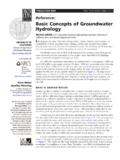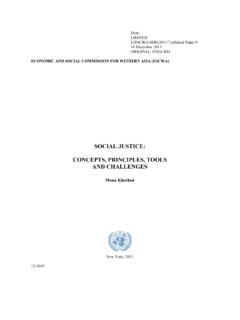Transcription of Disease, illness, sickness, health, healing and ... - Medical …
1 disease , illness , sickness, health, healingand wholeness: exploring some elusiveconceptsKenneth M BoydEdinburgh University Medical School and The Institute of Medical EthicsAbstractConcepts such as disease and health can be diYcultto define precisely. Part of the reason for this is thatthey embody value judgments and are rooted inmetaphor. The precise meaning of terms like health, healing and wholeness is likely to remain elusive,because the disconcerting openness of the outlookgained from experience alone resists the reduction offirst-person judgments (including those of religion) tothird-person explanations (including those ofscience).(J Med Ethics: Medical Humanities2000;26:9 17)Keywords:Health; disease ; healing ; wholeness; illness ;sicknessIntroductionIn this paper, I want to explore possible meaningsof a cluster of words disease , illness , sickness, health, healing and wholeness.
2 Many people havetried to elucidate what these words mean, butagreed definitions are often elusive. In whatfollows I shall begin with some definitions of dis-ease, illness and sickness. I shall then try to saywhy definitions of disease and health are soelusive; and I shall end with some observations onscience and religion, in the light of which the dif-ficulty of defining health, healing and wholenessmay make some kind of definitionsDis-ease (from old French and ultimately Latin) isliterally the absence of ease or elbow room. Thebasic idea is of an impediment to free nowadays the word is more commonly usedwithout a hyphen to refer to a disorder of struc-ture or function in an animal or plant of such adegree as to produce or threaten to producedetectable illness or disorder or again, morenarrowly, to a definable variety of such adisorder, usually with specific signs or symptomsor aVecting a specific location.
3 That at least ishow theNew Shorter Oxford Dictionary1defines it,adding as synonyms: (an) illness , (a) sickness .Let me stay with the dictionary to see what it saysabout those has three definitions. Two of them are ofthe way the word was used up to the 18thcentury to mean either wickedness, depravity,immorality , or unpleasantness, disagreeable-ness, hurtfulness . These older meanings reflectthe fact that the word ill is a contracted form of evil . The third meaning, dating from the 17thcentury, is the modern one: Ill health; the state ofbeing ill . The dictionary defines ill in this thirdsense as a disease , a sickness . Looking up sick-ness we find The condition of being sick or ill; illness , ill health ; and under sick (a Germanicword whose ultimate origin is unknown, but maybe onomatopoeic) we find aVected by illness ,unwell, ailing.
4 Not in a healthy state , and, ofcourse, having an inclination to vomit .There is a rather unhelpful circularity aboutthese dictionary definitions. But dictionaries ofthe English language usually only aim to tell us theorigins of words and how they have been used his-torically. They do not aim at the much more con-testable goal of conceptual clarity. For that wehave to look elsewhere. In this case, let us look athow disease , illness and sickness have been eluci-dated first by a Medical practitioner, who ought toknow something about the subject; and then, afternoting some popular and literary definitions, by aphilosopher, who ought to know something aboutconceptual Medical definitionProfessor Marshall Marinker, a general prac-titioner, suggested over twenty years ago a helpfulway of distinguishing between disease , illness andsickness.
5 He characterises these three modes ofunhealth as follows. is a pathological process, most oftenphysical as in throat infection, or cancer of thebronchus, sometimes undetermined in origin, asin schizophrenia. The quality which identifies dis-ease is some deviation from a biological Med Ethics: Medical Humanities2000;26:9 17 on February 1, 2022 by guest. Protected by Humanities: first published as on 1 June 2000. Downloaded from There is an objectivity about disease whichdoctors are able to see, touch, measure, are valued as the central facts in themedical is a feeling, an experience ofunhealth which is entirely personal, interior to theperson of the patient. Often it accompaniesdisease, but the disease may be undeclared, as inthe early stages of cancer or tuberculosis ordiabetes.
6 Sometimes illness exists where nodisease can be found. Traditional Medical educa-tion has made the deafening silence of illness -in-the-absence-of- disease unbearable to the clini-cian. The patient can oVer the doctor nothing tosatisfy his is the external and public mode ofunhealth. Sickness is a social role, a status, anegotiated position in the world, a bargain struckbetween the person henceforward called sick ,and a society which is prepared to recognise andsustain him. The security of this role depends ona number of factors, not least the possession ofthat much treasured gift, the disease . Sicknessbased on illness alone is a most uncertain even the possession of disease does not guar-antee equity in sickness. Those with a chronic dis-ease are much less secure than those with an acuteone; those with a psychiatric disease than thosewith a surgical one.
7 Best is an acute physicaldisease in a young man quickly determined byrecovery or death either will do, both are equallyregarded. 2 disease then, is the pathological process, devia-tion from a biological norm. illness is thepatient s experience of ill health, sometimes whenno disease can be found. Sickness is the rolenegotiated with society. Marinker goes on toobserve that a sizeable minority of patients whoregularly consult general practitioners, particu-larly for repeat prescriptions, suVer from none ofthese modes of ill health. They appear, rather, tobe seeking to establish a healing relationshipwith another who articulates society s willingnessand capability to help . So a patient , in thesense of someone actively consulting a doctorrather than just being on the books, does not nec-essarily mean someone who has a disease , feels ill,or is recognised to be sick; and of course there areother more mundane reasons, short of wanting toestablish a healing relationship, why a patient mayconsult a doctor to be vaccinated before travel-ling abroad for example.
8 Most patients most ofthe time however, probably can be classified ashaving a disease , or feeling ill, or being recognisedas and literary definitionsFor some patients, the last of these may be themost important. Recently I was handing out to aclass of Medical students the General MedicalCouncil s booklets onThe Duties of a janitor who was helping me unpackthem remarked: As far as I m concerned themain duty of a doctor is to give me a sick note,otherwise I won t get sick pay . A week later, on atrain, I met a recently unemployed man whorecounted to me at some length how he hadcajoled his general practitioner into signing himoVfor a few months longer, so that he could keepon getting sick pay until he got to pensionable according toHystories, by the American criticElaine Showalter,3new ways of getting recognisedas sick are being found all the time.
9 Modern cul-tureiscontinuallyspawninghystericale pidemics in the pre-millennial years, ME, Gulfwar syndrome, recovered memory, multiple per-sonality syndrome, satanic abuse and alien abduc-tion. These, a sympathetic reviewer of the bookexplained, were examples of: the conversion of emotional pain and conflictinto the camouflaged but culturally acceptablelanguage of body . Typically, individualswho are unhappy or unfulfilled in their livesdevelop diVuse and evolving nervous complaintsand eventually seek help. A physician, or someother scientific authority figure, concocts aunified field theory providing a clear and coherentexplanation for the confusing symptoms , as wellas a new and a memorable name for the explanation draws on contemporary diseasetheory, usually viral and immunological ideas. Anindividual case or two, often involving a well-known public personality, provides a popularparadigm for the new synthesis of symptoms.
10 Abest selling novel .., soon to become a majormotion picture, first advertises the syndrome to alarge audience. Magazine stories and televisiondocumentaries further publicise the books for persons seeking infor-mation appear, as do patients recently, daily talk-shows, those agencies ofmass pop psychotherapy, unite suVerers andtherapists in order to dramatise their life storiesand to explain the meaning of their disorder formillions; in the process, participants cite enor-mous projected numbers of the aZicted andencourage others to come . These areacutely communicable . 4So the reviewer, expounding Showalter, with ME and Gulf war veterans, bycontrast, understandably might contest this viewof what they are suVering from; and more10 disease , illness , sickness, health, healing and wholeness: exploring some elusive concepts on February 1, 2022 by guest.




